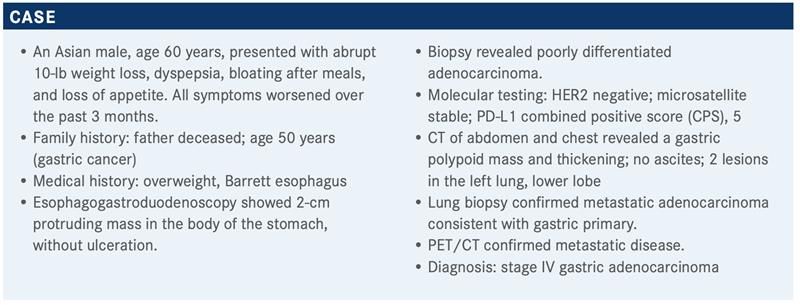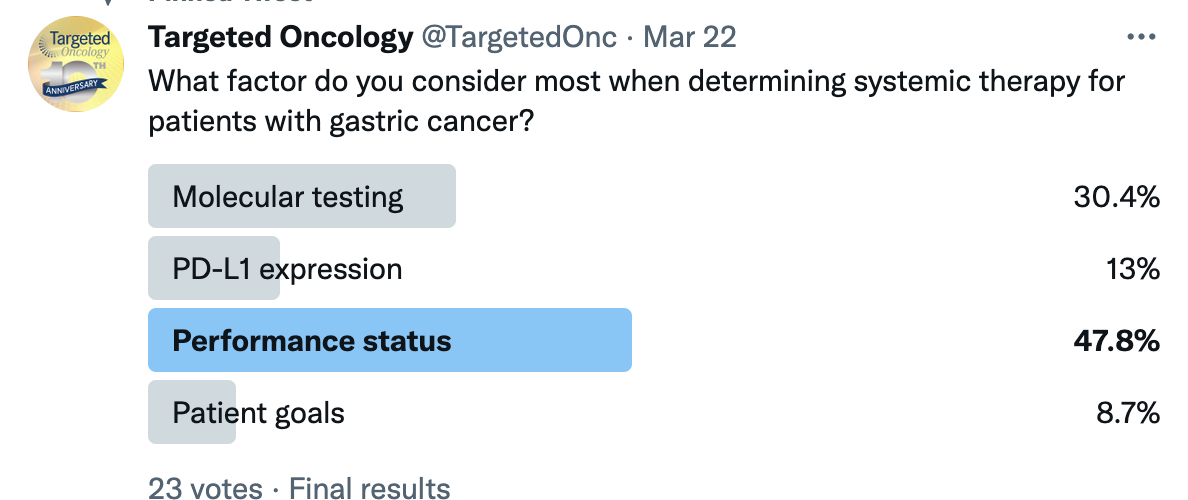Tweet Chat Recap: Janjigian Discusses Biomarkers to Consider for Patients With Gastric Cancer
In an interview with Targeted Oncology following the tweet chat, Yelena Y. Janjigian, discussed the key takeaways from the discussion and highlighted the biomarkers and standard of care for the patient in this case.

Targeted Oncology was joined on Twitter by Yelena Y. Janjigian, MD, a medical oncologist and chief of the Gastrointestinal Oncology Service at Memorial Sloan Kettering Cancer Center for the discussion of a 60-year-old man with stage IV gastric adenocarcinoma and the advancements in gastric cancer.

There are many biomarkers for oncologists to consider when determining systemic therapy for this patient population. In a Twitter poll ahead of the discussion, Targeted Oncology followers shared their thoughts on what factor should be considered most when determining systemic therapy for patients with gastric cancer? The majority of followers (47.8%) voted for the performance status, while many other followers (30.4%) voted for molecular testing. Additionally, some people voted for PD-L1 expression (13%) or patient goals (8.7%) to be the most important factor.

While biomarker testing is needed to help make treatment decisions in gastric cancer, Janjigian notes that functional status is the most important factor, followed by patient goals and preference and lists the first-line biomarkers which are routinely done at Memorial Sloan Kettering Cancer Center.

When discussing triggers to change second-line therapy for this patient, Janjigian noted that at her practice, patients are monitored very closely for radiographic disease progression and patients start with second-line therapy if there is clear disease progression or intolerance of first-line therapy. To monitor disease progression in patients with stage IV disease, a CT scan of the chest, abdomen and pelvis is taken prior to the start of therapy as well as every 4 cycles of treatment.
In an interview with Targeted OncologyTM following the tweet chat, Janjigian, discussed the key takeaways from the discussion and highlighted the biomarkers and standard of care for the patient in this case.
What were some of the interesting characteristics of the case discussed in the tweet chat?
Janjigian: Today's chat was focused on gastric cancer and since 2021, and now the beginning of 2022, it has been a monumental year for patients with metastatic disease. We reviewed first line therapy, the critical considerations when you're meeting a patient for the first time and we reviewed the case of a patient with HER2 negative PD-L1 positive gastric cancer, metastatic to the lung.
At the time of the interview, molecular testing led our twitter poll as being the most important factor when considering systemic therapy. What were your thoughts on this choice?
Our poll results suggested that molecular testing was the most important characteristic that people used to consider first line therapy. In my experience, the patient's functional status is the first and obviously the patient's preference as well. It's important to discuss goals of care early and to continue to discuss them frequently with patients.
Can you discuss the standard of care in this patient population and how it factors into the case?
The standard of care currently in the United States, and most countries worldwide now, is a combination of FOLFOX plus nivolumab. Our case highlighted a patient with a CPS positive score. CPS 5 emphasis was the primary end point of the CheckMate-649 study showing a benefit and overall survival, overall response progression free survival and these patients. In fact, for the first time in over a decade, we were able to demonstrate a positive study that demonstrated a really promising median overall survival compared to standard of care. We are very fortunate and very happy to be able to bring this to our patients.
In terms of other characteristics and biomarkers, we typically test for HER2 which was done in this patient, MSI, and also recommend germline and molecular testing of the tumor because in gastric cancer in particular, we have been seeing more sporadic cases of de novo germline alterations in CDH-1, de novo lynch, other alterations that may be important like CHEK2 alterations and so on. Other biomarkers we talked about that are coming in the future, we still test routinely for Epstein Barr, EBV, is a subset of gastric cancer driven tumors. FGFR2 is an important biomarker. Immunohistochemistry overexpression will likely be important in the future, though it is not clinically in practice yet, as well as claudin immunohistochemistry overexpression that is coming in the next year or 2.
When would you switch to second-line therapy for these patients?
We typically continue therapy beyond maximum response and patients continue on maintenance therapy with nivolumab after maximum response. We do not stop therapy; we do not give treatment interruptions unless the patient is frail or is planning a trip or something like that. To that extent, there are other clinical considerations stopping treatment that makes the cancer more likely to progress.
If the patient has evidence of progression of disease, but it's functional, the patient will receive second line therapy with paclitaxel and ramucirumab, typically as the standard or go on a clinical trial, and there other promising agents for HER2 positive disease. Certainly, there's other HER2 directed treatments approved, but this patient was for HER2-negative [disease]. In terms of how often we scan the patients, it's typically every 2 months or so in the beginning and then after initial 6 months to 8 months, we often space it out if the patient is doing well and there's no evidence of progression. We scan them every 3 months or so.
REFERENCES:
1. NCCN. Clinical Practice Guidelines in Oncology. Gastric cancer, version 2.2021. Accessed April 6, 2021. https://bit.ly/31QtZAS
2. Bartley AN, Washington MK, Colasacco C, et al. HER2 testing and clinical decision making in gastroesophageal adenocarcinoma: guidelines from the College of American Pathologists, American Society for Clinical Pathology, and the American Society of Clinical Oncology. J Clin Oncol. 2017;35(4):446-464. doi:10.1200/JCO.2016.69.4836
T-DXd Combinations Effective in HER2+ Gastric and GEJ Cancer
September 14th 2024Findings from the DESTINY-Gastric03 study support the further exploration of the antibody-drug conjugate trastuzumab deruxtecan for the first-line treatment of patients with advanced HER2+ gastric, esophageal, and GEJ cancers.
Read More